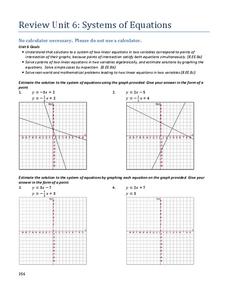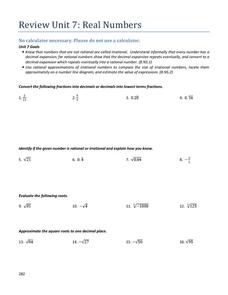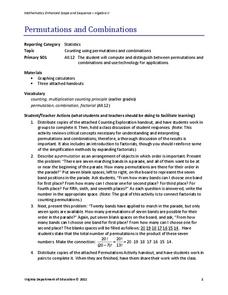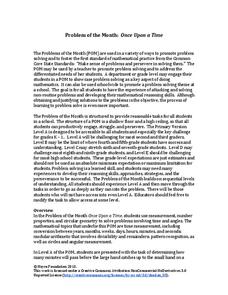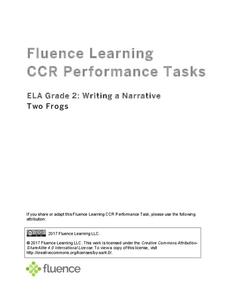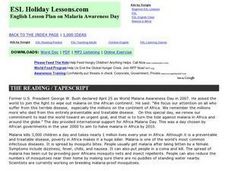Charleston School District
Review Unit 6: Systems of Equations
It's time to show off what they learned! The final lesson in the series is a review worksheet on the topics learned throughout the unit. Scholars solve systems of equations using graphic and algebraic methods, solve system-based word...
Charleston School District
Review Unit 7: Real Numbers
Provide pupils with problems to check their understanding of the concepts within the unit. The seven-part series of lessons covers concepts related to irrational numbers. Learners convert between fractions and decimals, estimate the...
It's About Time
Are Atoms Invisible?
Wow, an experiment that allows the class to participate in a missile war! Pupils discuss Thomsons's theory of cathode rays and simulate Rutherford's historical experiment to learn about atomic structure. They conclude this fourth lesson...
Herff Jones Education
Chemical Energy
Provide the class with a quick lesson on chemical energy as they are assisted in creating hot and cold packs to demonstrate energy transfer between objects. They observe the energy change in matter as it transforms and distinguish...
Virginia Department of Education
Permutations and Combinations
Counting is not all it adds up to be — sometimes it involves multiplying. The lesson introduces permutations and combinations as ways of counting, depending upon whether order is important. Pupils learn about factorials and the formulas...
Noyce Foundation
Once Upon a Time
Examine the relationship between time and geometry. A series of five lessons provides a grade-appropriate problem from elementary through high school. Each problem asks learners to compare the movement of the hands on a clock to an angle...
Noyce Foundation
Miles of Tiles
Create number sentences and equations to solve geometric problems. Each activity in the series of five asks young mathematicians to consider different-sized tiles to build structures according to specific criteria. The first activities,...
Fluence Learning
Writing a Narrative: Two Frogs
Three options offer young writers the opportunity to read a short story, answer questions, and write a response. A handy language arts resource focuses on reading comprehension and analyziing the story's lesson: look before you leap.
California Education Partners
Colorful Data
Scale up your lessons with a performance task. Young data analysts work through an assessment task on scaled bar graphs. They answer questions about a given scaled bar graph on favorite colors, analyze a bar graph to see if it matches...
Curated OER
Heroes and Heroines
In this heroes and heroines worksheet, students make a list of some quiet heroes from this century. Students choose one hero and write a few paragraphs and draw a scene from the hero's life. The page refers to a previous lesson that is...
Curated OER
Sets of Chromosomes
In this chromosome worksheet, high schoolers answer eighteen questions about chromatids, chromosomes, types of reproduction, haploid and diploid cells and zygotes.
Curated OER
ESL Holiday Lessons: Malaria Awareness Day
For this ESL reading comprehension worksheet, students read a passage about World Malaria Awareness Day. Students answer 100 varied questions about the text. There are links provided for online exercises and MP3 listening as well.
Curated OER
Romeo and Juliet Promptbook - The Balcony Scene
In this Romeo and Juliet worksheet, students view three versions of the balcony scene. Students discuss why the director chose the elements for the film versions. Students then complete a prompt-book activity analyze the setting,...
Curated OER
Synthesize, Don't Summarize
In this reading and writing analysis worksheet, students read two passages, one a summary of Flowers for Algernon and one a synthesis of the novel. The goal for students is to understand the effectiveness of synthesizing a piece of...
Prestwick House
Vocabulary Activity Sheet
What does it mean to stream a program? How do you know if you're watching a mash-up? If you don't know these words, reach for your handy Merriam-Webster dictionary, because they're there! A series of fill-in-the-blank questions prompt...
EngageNY
Properties of Area
What properties does area possess? Solidify the area properties that pupils learned in previous years. Groups investigate the five properties using four problems, which then provide the basis for a class discussion.
EngageNY
Equations for Tangent Lines to Circles
Don't go off on a tangent while writing equations of tangent lines! Scholars determine the equations for tangent lines to circles. They attempt both concrete and abstract examples, such as a tangent line to the unit circle through (p, 0).
EngageNY
Selecting a Sample
So what exactly is a random sample? The 15th part in a series of 25 introduces the class to the idea of selecting samples. The teacher leads a discussion about the idea of convenient samples and random samples. Pupils use a random...
EngageNY
The Scaling Principle for Area
As they investigate scaling figures and calculate the resulting areas, groups determine the area of similar figures. They continue to investigate the results when the vertical and horizontal scales are not equal.
EngageNY
Conversion Between Celsius and Fahrenheit
Develop a formula based upon numerical computations. The 31st part of a 33-part unit has the class determine the formula to convert a temperature in Celsius to a temperature in Fahrenheit. They do this by making comparisons between the...
EngageNY
Writing and Evaluating Expressions—Multiplication and Addition
How many people can sit around a table? The 22nd part in a series of 36 continues the work on writing and evaluating expressions to include expressions with two operations. Pupils use models to determine an expression for the number of...
Laboratory for Atmospheric and Space Physics
Growing Up With A Mission
New Horizons began its journey to Pluto in 2006. Ten years later, it continues its mission. In that time, scholars have surely grown, but how much more will they grow by the time New Horizons reaches its destination? Find out with an...
EngageNY
General Pyramids and Cones and Their Cross-Sections
Are pyramids and cones similar in definition to prisms and cylinders? By examining the definitions, pupils determine that pyramids and cones are subsets of general cones. Working in groups, they continue to investigate the relationships...
EngageNY
Criterion for Perpendicularity
The Pythagorean Theorem is a geometry pupil's best friend! Learners explain the equation a1b1 + a2b2 = 0 for perpendicular segments using the Pythagorean Theorem. They are able to identify perpendicular segments using their endpoints and...


